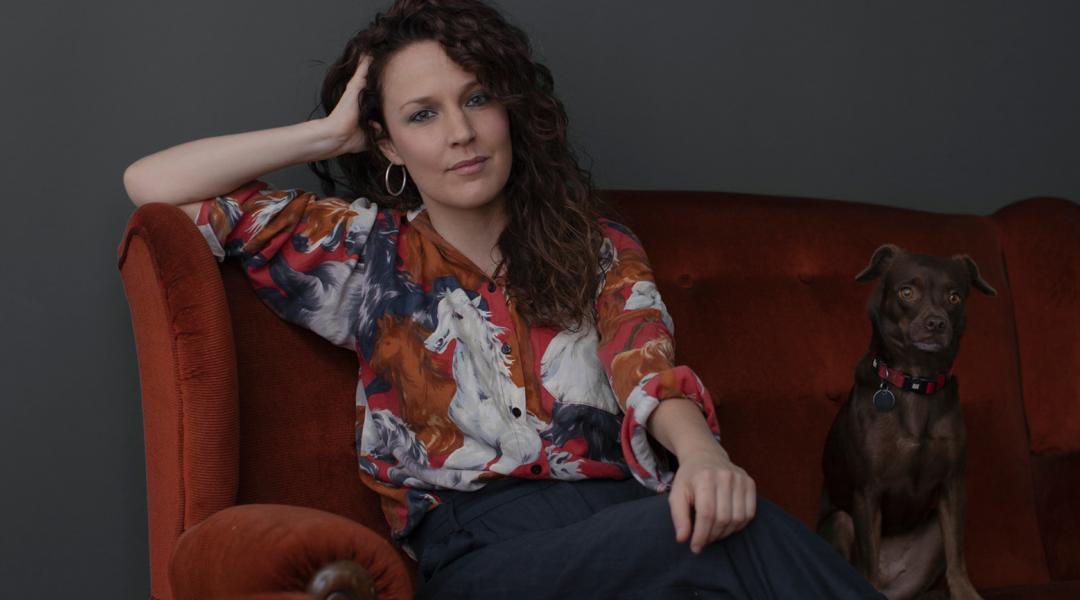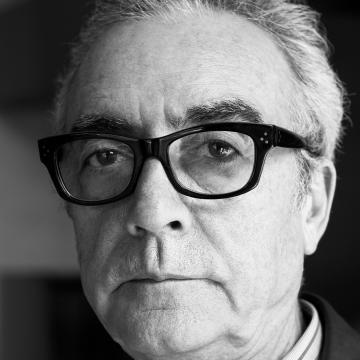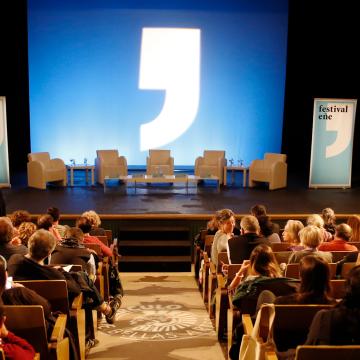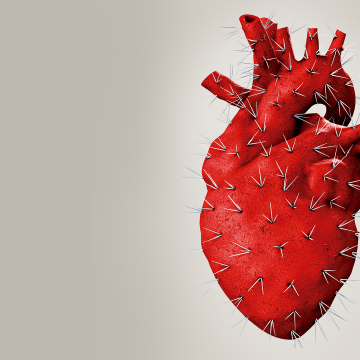Since opening on the 17th of April, Espacio Iberia has welcomed dozens of guests with one thing in common: their infinite talent. Talent that has inspired all the people who have sat there to listen to them.

From writing a piece about how the Bélmez's faces ruined her computer, to interviewing La Veneno, giving a TED talk and singing with her band Los Celos. Sabina Urraca has few things left to do in life. She is performing at the Eñe Festival with a monologue about a moment in which “literature is colliding against the ropes of the real world.” Keep it going, Sabina!
Before her 2017 literary debut, Sabina Urraca (San Sebastián, 1984) was already renowned in the underground scene thanks, mostly, to her signature chronicles and reports, in which the narrator’s voice played a crucial role in the story, transcending the boundaries between journalism and biography, reality and fiction. Her first novel came shortly after that. Las niñas prodigio is a partially autobiographical account of identity that she wrote inside the walls of a house without running water in La Alpujarra, Granada.
On 15 November, the Madrid-based writer and journalist will be performing at the Eñe Festival with the monologue Escríbete algo (Write something), about "a time when literature meets the most overwhelming reality, when a writer gets a pat on the shoulder from someone in their family and asks them to write a few words for a golden wedding, a birthday, or a funeral.” We stole a few minutes from her to take some photographs in one of her favourite places in Madrid, the fashion design studio Carmen17, and to ask her about haters, women with loudspeakers and subjectivity as a creative power.
Your first novel, Las niñas prodigio (Fulgencio Pimentel, 2017), could be described as a hybrid text, very common now in bookshops today; one in which memory and fiction intermingle, giving rise to an ambiguous narrative in which not everything is true or false. Does writing from the reconstruction of a diffuse self give you more freedom?
I think people have grown too fond of that term, as if it were something new and transgressive, when the fact is that the so-called fiction of the self was something the likes of Unamuno, Azorín, Dante or Colette also practiced. More recent examples are Sophie Calle, Christine Angot, and Almodóvar. The fiction of the self is not about the freedom of feeling unashamed of talking about yourself; rather, it’s a creative, boundless freedom. What really matters is to write a good story, regardless of the materials with which it has been told or the source these materials come from.
Before devoting yourself full time to writing, you studied film. When did that plot twist take place?
I've always liked films a lot, and I think that, as a teenager, I assumed it was the only practical way to do something with my writing. Being a writer was a childhood dream I gave up when I turned fourteen. But the truth is that I never liked to write screenplays, and I think I wasn’t good enough. I remember feeling dead loss at film school. However, I worked for a few years as a screenwriter and writing copy for television, feeling that adult life consisted in putting up with that, which never really convinced me. It was the frustration I felt working in an office which pushed me to start writing again.
You were born in Donosti, but you grew up in Tenerife. Later, you settled in Madrid, where you reside now. How do you think all this moving around has forged your identity?
Practically speaking, as a writer, it’s a disadvantage. I’m neither a Canary Islander nor a Basque writer. I’ll never be featured in an anthology of Canary Islands writers or Basque writers. Lacking a geographical label is limiting. But, of course, there’s the uprooting issue--being a Basque girl in Tenerife and a Canary Islander in Donosti made me build a hybrid identity which I suppose allows me to tell things differently from someone belonging to just only place. I also believe that the feeling of being in one place and thinking the other one was the true one was important to me. But then, when I moved to the other place, I realized that my "true place" was nowhere. Now I feel something similar with writing. It’s is the only place where I truly feel home, the only place I can explain and understand. And from a mundane point of view, I must say that I’m also very happy celebrating the San Isidro festivities in Madrid. I love folklore, I love Madrid. And I also love the Canary Islands and the Basque Country. I feel that right now I’m reconciled with all the places I come from.
What does Sabina Urraca write for?
I write to tell things I feel can’t be told otherwise, to prevent myself from exploding or going crazy. And, of course, to amuse other people as best as I can, in the sense of making people get lost in thoughts, away from this world, for a moment at least—that’s my highest aspiration in life.
Do you believe in the transforming power of literature?
Of course. If I hadn’t read certain things, I would be a person with an absolutely different perception of life. Literature has taught me to look at and think about everything I live in a certain way from the time I wake up until I go to bed.
And in its indoctrinating power?
No, not in principle. Literature shows all paths in all their complexity and leaves them open to interpretation. When I feel a novel is trying to force me into thinking something specific, I stop reading. In think that’s a clumsy and coward path.
If you could write another person's fictional biography, who would that be?
Cicciolina. However, I tend to be more interested in anonymous characters, in the hidden heroism and brilliance of people that are close to me.
“When I feel a novel is trying to force me into thinking something specific, I stop reading. In think that’s a clumsy, coward path”
You say being demanding is one of your defects, or one of your virtues, depending on how you look at it. Do you have an antidote against the writer’s block?
Clenching my teeth and keep writing, even if what you’re writing is crap. At some point, after all that clenching and all that darkness there comes a little ray of light to cling to. Or so I like to think.
On more than one occasion you have addressed haters in social networks. How does cyber scrutiny affect you?
I usually say good things in social networks. They’re a showcase for human beauty and misery. And having that permanently available source is a gift for a writer. But I’m aware that a high exposure is dangerous. I’ve had some scares. But, in general, despite being quite active in them, I’ve put limits around my private life. I think that’s important to avoid going crazy or losing your soul.
However sad it may sound, many people can’t stand a woman with a loudspeaker, don't you think?
If a woman speaking or writing is a problem for anyone is, I guess, because she isn’t seen as someone sending a universal message, but rather as a woman sending an exclusively feminine message, because maybe she’s speaking about things that that annoyed person has never heard of, or at least not coming out of the mouth of a woman. A man with a loudspeaker is no problem for the simple reason that he will be perceived as a person with a loudspeaker.
Due to the tone and forcefulness of your articles, in which personal experience is crucial, you have been often associated with gonzo journalism. Do you identify with that?
Gonzo journalism exists since the 70s. I have no problem with that label. In my case, doing that kind of journalism has allowed me to link journalism and literature. I think that, when literature is at the service of journalism, it allows for a broader, more attractive view of reality.
“Social networks are showcase for human beauty and misery. Having that permanently available source is a gift for a writer.”
Do you regret having written anything in particular?
I do, many things. It’s not that I feel terribly embarrassed, but the pace of today’s journalism, and of today’s life, often forces you to write content at a frantic pace that doesn’t allow ideas to settle.
What are your plans for next year?
I’m writing a new book, which I hope to have finished by mid-2020. What I’m most excited about next year is my work as a resident editor at Editorial Barrett. I have spent the last months editing Panza de Burro, the debut novel of Andrea Abreu, a writer from the Canary Islands who was a student of mine at the Fuentetaja school. It’s a fabulous novel. It’s the book I would have liked to write if my identity had been forged only in the Canary Islands.



